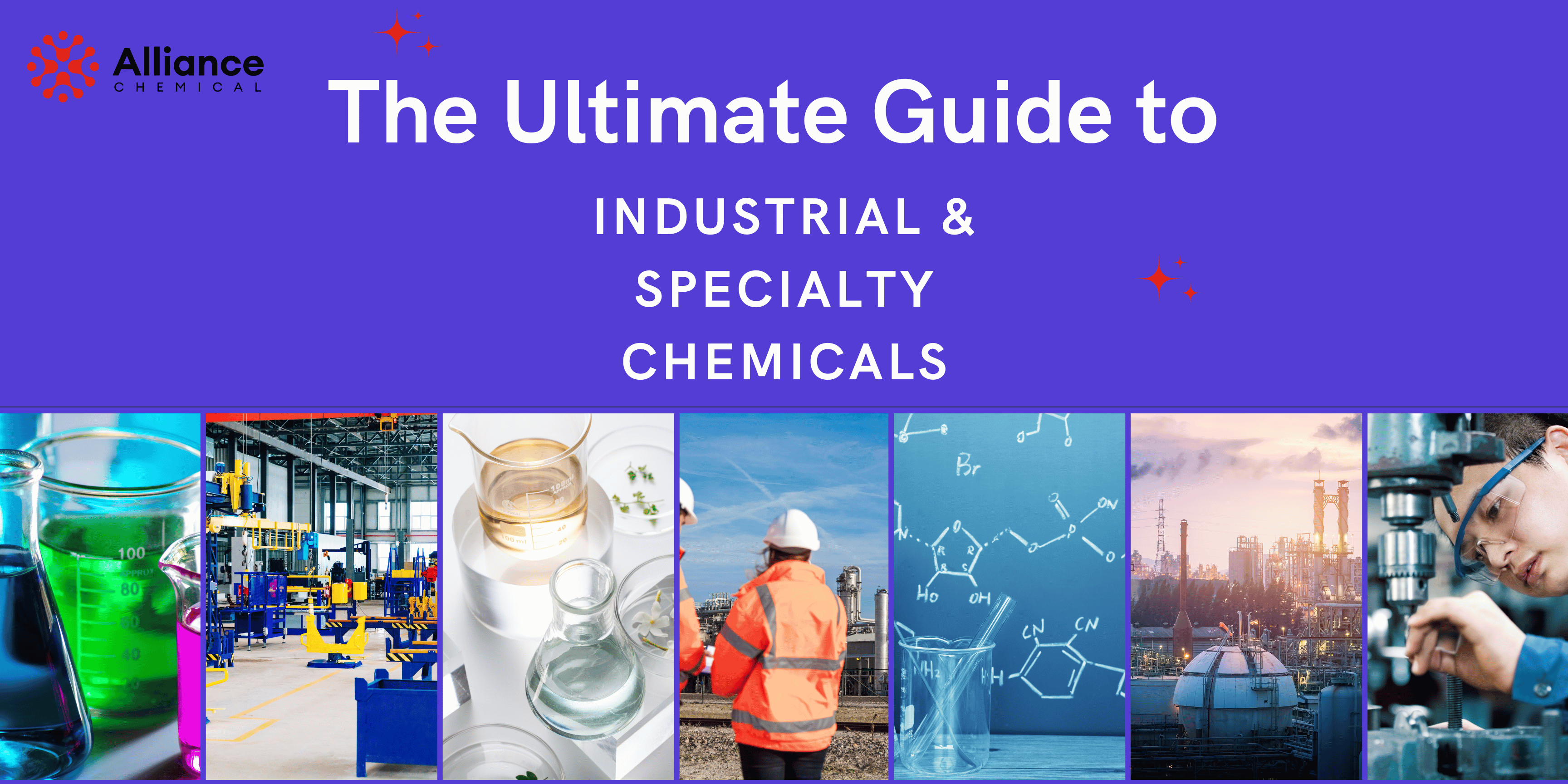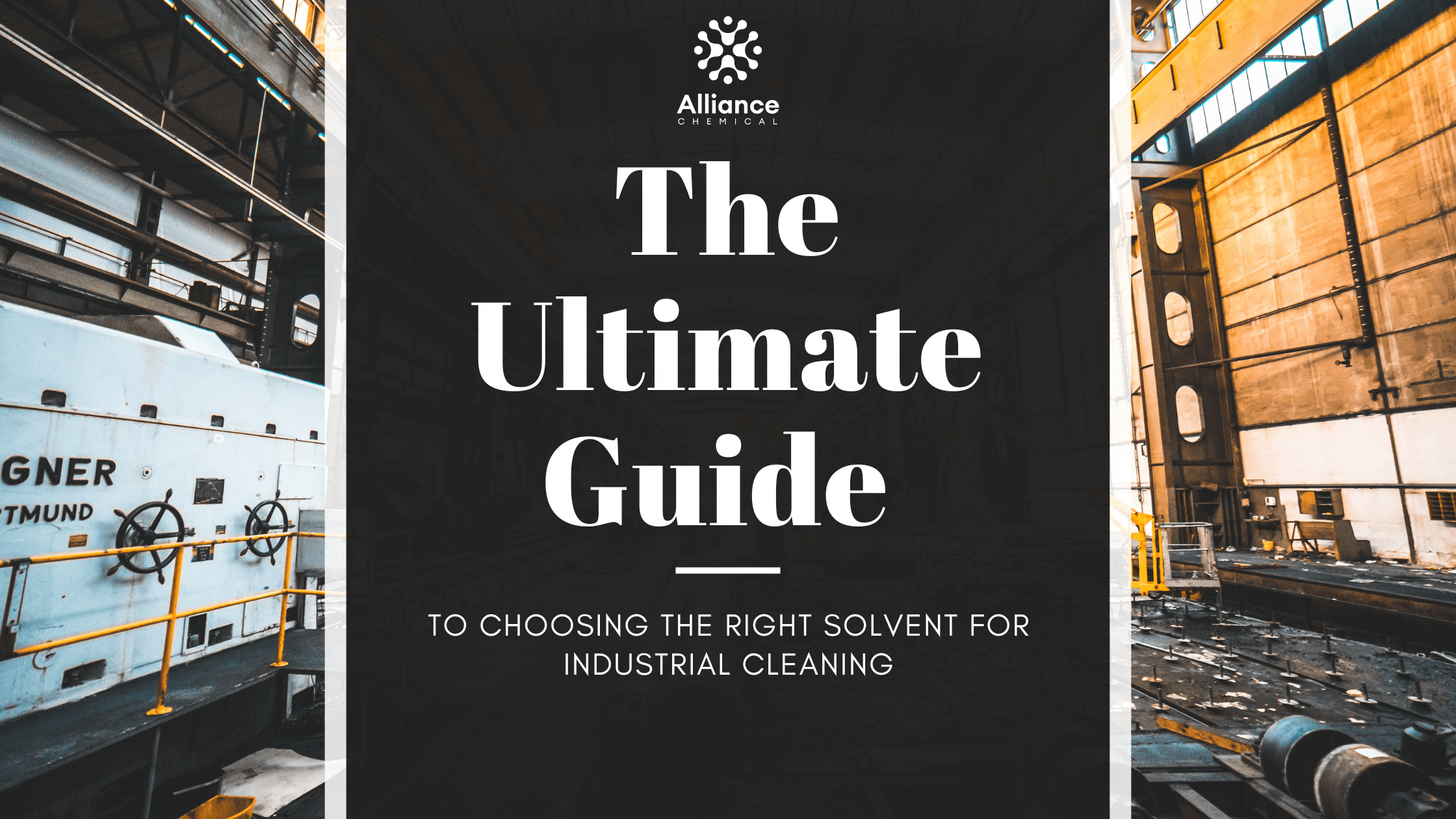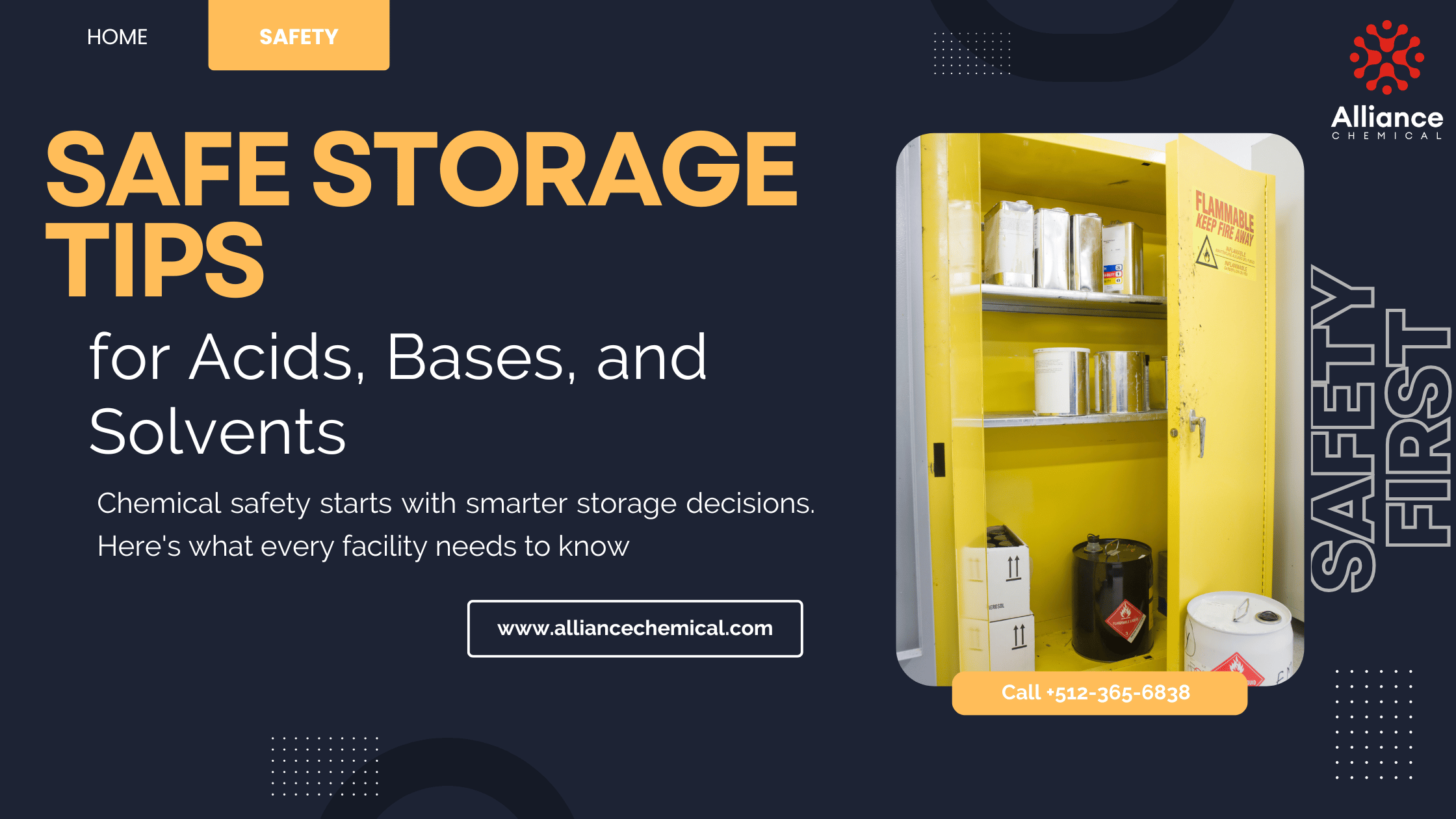
The Ultimate Guide to Industrial & Specialty Chemicals
Explore Alliance Chemical's massive product range of acids, bases, solvents, oxidizers, glycols, and more. Discover best practices, safety insights, real-world applications, and expert tips—all in one comprehensive guide.
Introduction: Understanding Industrial & Specialty Chemicals
Industrial and specialty chemicals are the backbone of countless sectors, fueling modern innovation in everything from water treatment facilities and large-scale manufacturing plants to small R&D labs and even everyday household cleaning. When you open your toolbox of chemical solutions, you're connecting to centuries of scientific discovery, refined standards, and constant optimization.
At Alliance Chemical, we strive to deliver not only high-quality chemicals but also the knowledge necessary to use them safely and effectively. Our mission is to ensure that whether you're an industry veteran, a dedicated researcher, or an entrepreneurial DIY enthusiast, you have everything you need for success.
This guide serves as a comprehensive resource crafted meticulously to help you navigate common chemical categories, best practices, real-world applications, and more. By the end, you'll be prepared to make informed purchasing decisions and apply these compounds effectively in your workplace or project environment.
Our Commitment to Quality
Alliance Chemical offers various grades of chemicals to meet different industry needs - from Technical Grade for industrial applications to ACS Grade for analytical work and USP/Food Grade for consumer applications. All our products come with detailed Safety Data Sheets and proper labeling for regulatory compliance.
Why Industrial & Specialty Chemicals Matter
Before diving into specifics, it's important to recognize why these chemicals are so crucial. The industrial revolution—and the countless mini-revolutions that followed—were propelled by chemical advancements. Each new synthetic route, purification technique, or specialized compound catapults industries to new levels of efficiency, sustainability, and quality control.
Consider a typical day: the water you drink is treated with coagulants like ferric chloride or various other water treatment chemicals. The car you drive runs on fuel that had to be refined and stabilized, often involving solvents and catalysts. The phone in your pocket required microchips etched with high-purity acids such as sulfuric acid (ACS grade) or nitric acid.
Foundation of Industry
Industrial chemicals enable manufacturing processes, infrastructure development, and technological innovation across virtually every sector of the economy.
Resource Optimization
Specialty chemicals help maximize efficiency, reduce waste, and improve product quality by providing precise solutions to complex problems.
Environmental Solutions
From water treatment to waste management, chemicals are essential for maintaining environmental standards and protecting public health.
Research & Development
High-purity chemicals enable scientific advancement, new material development, and the discovery of better processes and products.
Simply put, industrial and specialty chemicals have become integral to our way of life. Many businesses today cannot operate optimally—or at all—without a reliable supply of high-quality chemicals that meet strict standards. This is exactly where Alliance Chemical steps in, offering a massive product lineup to streamline operations, reduce downtime, and foster innovation.
Key Categories of Chemicals
Acids
Acids are a cornerstone of many industrial processes. They aid in etching, cleaning, pH adjustment, and much more. Depending on the concentration and specific acid, these powerful compounds can deliver highly targeted results.
- Hydrochloric Acid (HCl): This strong acid is frequently used for pH control, metal pickling, and concrete cleaning. Alliance Chemical's range of HCl includes multiple concentrations (e.g., 5%, 15%, 31%, 37%), fitting different industrial or laboratory needs.
- Sulfuric Acid (H2SO4): Another industrial giant, sulfuric acid is integral to battery manufacturing, fertilizer production, petroleum refining, and wastewater processing. Our sulfuric acid collection spans from 30% to 96% (ACS grade).
- Nitric Acid (HNO3): Widely used in the creation of explosives, etching metal, and purifying precious metals. Our nitric acid offerings include 20%, 25%, 40%, 65%, and up to 70% ACS-grade.
- Phosphoric Acid (H3PO4): From rust removal to food and beverage formulation, phosphoric acid is versatile and relatively user-friendly. Our product line covers food-grade concentrations (75% USP) to 85% technical or ACS grade.
- Organic Acids: Products like acetic acid (glacial) and oxalic acid serve important roles in processes from pickling solutions to wood bleaching.
Bases & Caustics
Bases and caustics balance out the industrial world. They neutralize acids, saponify fats, and provide strong cleaning abilities for removing grease, oils, and other contaminants from surfaces.
- Sodium Hydroxide (NaOH): Commonly known as caustic soda or lye, sodium hydroxide is used extensively in pulp and paper manufacturing, soap making, petroleum refining, and water treatment.
- Potassium Hydroxide (KOH): Often utilized in biodiesel production, fertilizers, and pH regulation, potassium hydroxide can be slightly more soluble and quicker to react than NaOH in certain applications.
- Ammonium Hydroxide (NH4OH): This solution, often referred to simply as "ammonia" in cleaning products, is notable for its strong cleaning and degreasing properties. Ammonium hydroxide solutions are also used in fertilizer production.
Solvents
Solvents dissolve or disperse other substances, forming a solution. They are indispensable in applications ranging from chemical synthesis and paint thinning to cleaning and degreasing.
| Solvent | Key Applications | Special Properties |
|---|---|---|
| Isopropyl Alcohol (IPA) | Electronics cleaning, disinfection, pharmaceuticals | Quick evaporation, minimal residue |
| Methyl Ethyl Ketone (MEK) | Plastics production, adhesives, degreasing | Strong solvating power, faster drying |
| Acetone | Nail polish remover, polymer manufacturing | Dissolves resins, plastics, and greases |
| Toluene | Paint formulations, adhesives, chemical synthesis | Aromatic hydrocarbon with moderate evaporation |
| d-Limonene | Degreasing, cleaning, fragrance applications | Natural, biodegradable, citrus-based |
When selecting a solvent, consider factors like flash point, evaporation rate, toxicity, and compatibility with the substances you aim to dissolve. Always review the SDS and handle with care, especially if the solvent is flammable.
Oxidizers & Bleaching Agents
Oxidizers are chemicals that readily transfer oxygen atoms or remove electrons from other substances. In industrial settings, they're crucial for bleaching, disinfection, and reaction synthesis.
- Sodium Hypochlorite (NaOCl): The active ingredient in many bleaches, sodium hypochlorite solutions range from household laundry bleach (~5-6%) to industrial-grade (12.5% or more).
- Hydrogen Peroxide (H2O2): This colorless liquid sees wide use in bleaching paper pulp, disinfecting medical equipment, and more. Alliance Chemical's offerings vary from 3% technical to 30% ACS grade.
- Other Oxidizing Agents: Potassium permanganate, peracetic acid, chlorine dioxide, and more specialized oxidizers for niche sectors.
OXIDIZER SAFETY WARNING
Always remember that oxidizers are powerful and can cause or accelerate the combustion of other materials. They must be stored separately from flammables or combustibles and handled with vigilant safety protocols.
Salts & Inorganic Compounds
In the realm of industrial processes, salts and inorganic compounds are often overshadowed by acids and solvents. Yet, they're equally vital. They fulfill roles in binding, precipitation, catalysis, and more.
- Aluminum Sulfate (Alum) – for water treatment and paper sizing.
- Calcium Chloride – for dust control, de-icing, and desiccation.
- Sodium Carbonate (Soda Ash) – for glass manufacturing, pH control in pools, and detergent formulations.
- Sodium Thiosulfate – for chlorine neutralization in aquaria or municipal water.
Specialty Chemicals, Glycols & More
"Specialty chemicals" is a broad term, often encapsulating formulations or compounds crafted for specific, high-value applications. This includes:
- Glycols & Glycol Ethers – such as propylene glycol and ethylene glycol, commonly used as coolants, antifreeze, or solvents.
- Resins – from epoxy resins like Epona Resin 828 to other polymer precursors for adhesives, coatings, or composites.
- Emulsifiers and stabilizers – used in everything from cosmetics to industrial cutting fluids.
- Green solvents – like citrus-based d-Limonene, which is biodegradable and lower in toxicity.
Chemical Grade Guide
Understanding chemical grades is crucial for selecting the right product:
- Technical Grade: Suitable for most industrial applications where extreme purity isn't required
- ACS Grade: Higher purity for analytical work, research, and laboratory applications
- USP/Food Grade: Meets standards for food, pharmaceutical, or medical applications
Practical Applications & Industries
Food, Beverage, & Agriculture
In food and beverage production, food-grade chemicals are essential. Vinegar in various concentrations (from 10% to 75%) helps with cleaning, pickling, and flavoring. Phosphoric acid is often used in soft drinks for both flavor and pH regulation.
Agriculture depends on chemicals for fertilizers (like ammonium hydroxide or potassium compounds), pest control, and soil pH adjustments. Acetic acid, at higher strengths, has even gained traction as a natural herbicide in organic or low-chemical farming practices.
Water Treatment & Municipal Services
Ensuring clean, safe water is one of modern civilization's greatest achievements. Treatment facilities frequently use coagulants like aluminum sulfate (alum) or ferric chloride to remove impurities. Disinfection commonly involves sodium hypochlorite 12.5% or hydrogen peroxide.

pH adjustments rely on acids (like HCl) or bases (NaOH) depending on the source water chemistry. By optimizing the water's pH, facilities minimize corrosion in pipelines and ensure pathogens are effectively neutralized.
Manufacturing & Heavy Industry
Sectors such as automotive, aerospace, metal fabrication, and electronics manufacturing rely heavily on chemicals for everything from degreasing metal parts to creating specialized coatings. Toluene and xylene are indispensable in paint formulations, while sulfuric acid is used to process metals or in lead-acid batteries.
Electronics manufacturing frequently uses high-purity acids like nitric acid ACS grade or HCl ACS Reagent Grade for etching circuit boards. Meanwhile, glycols are used in cooling processes to keep high-temperature industrial machinery within safe limits.
Lab Research & Education
Educational institutions, research laboratories, and private R&D facilities are prime consumers of ACS-grade chemicals. These high-purity reagents ensure the reliability of results and reproducibility of experiments. Our lab chemicals range covers a spectrum from acetone ACS to potassium hydroxide flakes ACS.
Labs also frequently use deionized water (DI water) to avoid contamination in sensitive experiments. Whether you're mixing buffers, calibrating instruments, or synthesizing advanced materials, purity is non-negotiable. That's why many labs prioritize ACS or reagent-grade solutions from a trusted supplier like Alliance Chemical.
Construction & Infrastructure
From cleaning cement mixers with muriatic acid (aka HCl 31%) to sealing driveways and water-proofing foundations, chemicals play a quiet yet integral role in construction. Concrete surfaces can be prepped with acids to enhance adhesion of coatings or adhesives.
Surface Preparation
Acids for etching concrete, cleaning masonry, and removing efflorescence prior to sealing or painting.
Moisture Control
Desiccants and calcium chloride for controlling humidity in enclosed spaces and preventing moisture damage.
Corrosion Prevention
Rust converters and inhibitors to protect metal elements from environmental degradation.
Concrete Additives
Chemical admixtures that enhance concrete workability, strength, and durability in various conditions.
Automotive & Aerospace
In automotive assembly lines, chemicals are essential for cleaning, degreasing, painting, plating, and engine coolant formulations. Ethylene glycol or propylene glycol coolants help regulate engine temperatures, while MEK or toluene might be used in specialized adhesives or coatings.
Aerospace has even stricter tolerances, demanding extremely clean surfaces for bonding and finishing. Solvents like trichloroethylene (TCE) and perchloroethylene (PCE) can be crucial in high-precision degreasing operations. Meanwhile, certain acids help with chemical milling of aerospace-grade alloys.
Cannabis, Hemp, & Extraction Processes
The cannabis and hemp industry has grown exponentially. Extraction processes may use solvents like n-heptane, ethanol, or other specialized compounds to isolate cannabinoids and terpenes.
In addition to the extraction itself, pH balancing solutions, cleaning agents for equipment, and disinfectants for sanitary conditions are crucial in regulated markets. Alliance Chemical's Extraction collection is tailored for these unique operational demands, emphasizing safety and purity for consumer-facing products.
Handling & Safety Best Practices
No matter how beneficial these chemicals are, they can pose serious risks if improperly used or stored. Safety starts with education, which includes reading labels, consulting Safety Data Sheets (SDS), and implementing best practices consistently.

- Personal Protective Equipment (PPE): Goggles, gloves (nitrile or neoprene depending on chemical compatibility), aprons, face shields, and respirators should be standard gear, tailored to the chemical in use.
- Ventilation: Using chemicals in well-ventilated areas or under fume hoods is critical to avoid inhaling harmful fumes. Some operations might require specialized exhaust systems.
- Labeling & Documentation: Keep all containers clearly labeled, including hazard warnings. Maintain updated SDS for each chemical accessible in an organized binder or digital system.
- Spill Kits & Emergency Response: Accidents happen. Having a dedicated spill kit with absorbents, neutralizers, and PPE can prevent a small spill from becoming a major hazard.
- Training & Protocols: Ensure every team member is trained in chemical handling and knows the emergency procedures. Regular drills can help reinforce knowledge.
CRITICAL SAFETY CONSIDERATIONS
- Incompatibilities: Never store acids with bases, oxidizers with flammables, or reactive chemicals near incompatible materials.
- Proper Containers: Always use chemical-resistant containers appropriate for the substance being stored.
- Emergency Equipment: Ensure eye wash stations, safety showers, and fire extinguishers are accessible and functioning properly.
- Chemical-Specific Risks: Each chemical has unique hazards - be familiar with the specific risks and precautions for the substances you work with.
Storage & Disposal Guidelines
Improper storage or disposal can lead to environmental damage, health hazards, and even legal repercussions. Here's how to keep everything above-board:
Storage Essentials
- Segregation by Hazard Class: Acids away from bases, oxidizers away from flammables, etc. This is non-negotiable. Incompatibilities are often highlighted in SDS and reference charts.
- Temperature & Ventilation: Certain chemicals degrade or become more dangerous when exposed to extreme temperatures. Follow recommended conditions (e.g., "store at 2-8°C" or "keep away from direct sunlight").
- Spill Containment & Secondary Containment: Use spill trays, sealed cabinets, or specialized containers. This ensures that any accidental leakage remains localized.
- Stock Rotation & Shelf Life: Many chemicals have a limited shelf life. Keep track of expiration dates and practice first-in, first-out (FIFO) to avoid stockpiling obsolete materials.
Disposal Strategies
- Local & Federal Regulations: Always adhere to regulations from agencies like the EPA or your regional equivalents. Some chemicals require neutralization, while others must be handled by licensed hazardous waste contractors.
- Neutralization: For acids or bases, safe neutralization techniques can render the solution less hazardous before final disposal. However, do this only if you're trained and have the right setup.
- Recycling & Reuse: Many solvents can be distilled and reused, saving costs and reducing environmental impact. Explore closed-loop systems if your facility uses large volumes.
- Documentation: Keep detailed logs of how, when, and where you dispose of chemical waste. Proper record-keeping helps maintain compliance and traceability.
Frequently Asked Questions (FAQ)
- Q1: Which chemical grade do I need?
-
Answer: It depends on your application. ACS Grade is the highest purity and is ideal for analytical or research work. Technical Grade suits large-scale industrial tasks where absolute purity isn't critical. Food/USP Grade is for consumable or food-contact scenarios. Always confirm your specific requirements before purchasing.
- Q2: Can Alliance Chemical ship hazardous materials safely?
-
Answer: Yes. We follow strict regulatory guidelines and use UN-rated packaging to ensure safe transit. For large or specialized orders, our logistics team can coordinate everything from temperature control to hazmat labeling.
- Q3: What if I can't find a specific chemical on the site?
-
Answer: We continually update our catalog. If something isn't listed, contact us. We may be able to source it or provide a suitable alternative.
- Q4: Do you offer consultation or technical support?
-
Answer: Absolutely. Our service page details our consulting and support options. We can advise on product selection, safe handling, and compliance best practices.
- Q5: Are there eco-friendly alternatives for commonly used industrial chemicals?
-
Answer: Yes. D-Limonene is a prime example of a greener solvent. We also stock water-based solutions and other less hazardous agents. Always compare performance, cost, and sustainability factors.
Conclusion: Harnessing the Power of Chemistry
Industrial and specialty chemicals shape our modern world—from ensuring potable water and manufacturing advanced electronics to powering heavy machinery and supporting food production. Having a trustworthy source for these chemicals, backed by expert guidance, is crucial to operational success and safety.
Alliance Chemical prides itself on a vast, ever-expanding product portfolio, exceptional customer support, and a commitment to knowledge sharing through our articles and blog posts. Whether you're a seasoned chemist or exploring advanced materials for the first time, we stand ready to assist you every step of the way.
From acids to bases, from solvents to oxidizers, and everything in between—your journey is only just beginning. We hope this comprehensive guide serves as both an inspiration and a reference, helping you to use these substances confidently and responsibly.
Ready to Find the Right Chemical Solution?
Alliance Chemical provides high-quality chemicals for every industry and application. From small quantities for research to bulk orders for industrial processing, we've got you covered with expert advice and reliable products.
Shop Chemicals Ask an Expert








